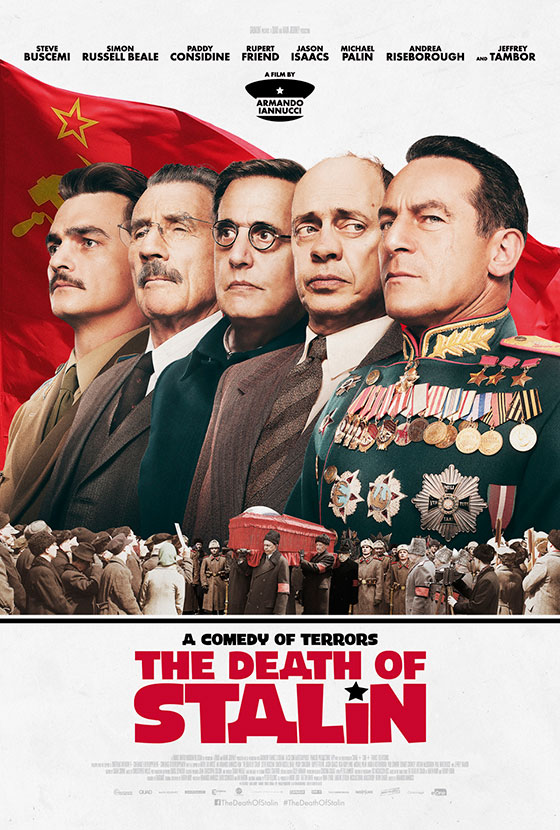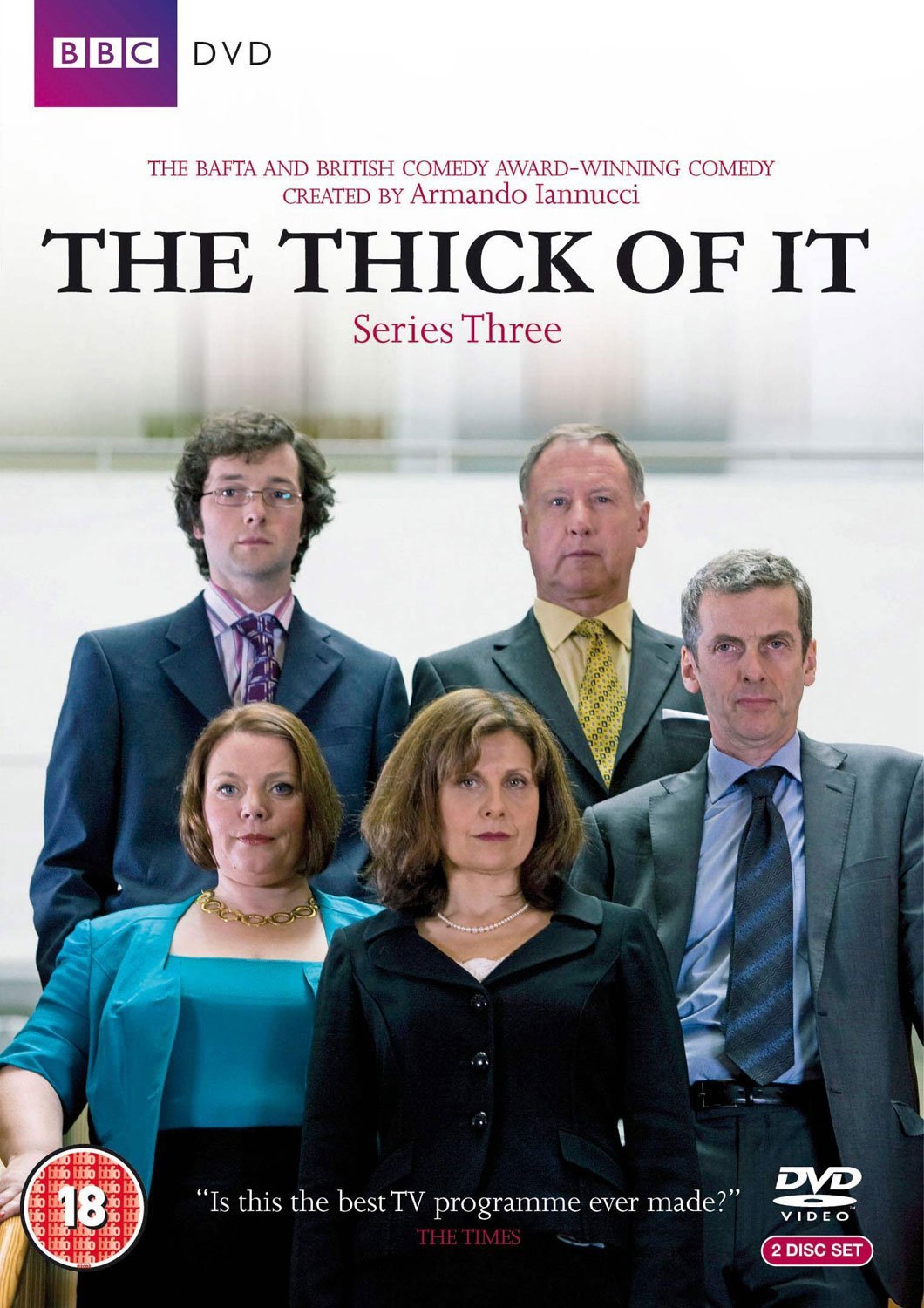Joseph Brooker on The Death of Stalin
Joseph Brooker on The Death of Stalin
Armando Iannucci’s film The Death of Stalin (2017) seemed to me to come out of nowhere, though it’s based on a French comic strip that most of its British viewers will never have heard of before. We knew from the BBC series The Thick of It that Iannucci was interested in politics and in satirizing its machinations and fixers, but from Malcolm Tucker to Joseph Stalin remains an unexpected escalation. The film takes place over a couple of days in 1953: Stalin dies of a sudden seizure at his dacha or mansion in the pines, and the Central Committee of lieutenants and ministers manoeuvre to replace him or settle scores, while arranging and attending Stalin’s funeral and placating his dipsomaniac son and eccentric daughter. The theme is one of the more evidently serious that history has to offer, but the film plays it as black farce. Perhaps there aren’t so many outright laugh-out-loud punchlines, but the tone is that frenetic one in which citizens are arrested, prisoners shot, lists of traitors concocted and dispatched with such brisk casualness that the viewer seems primed to laugh at the outrageousness as much as being appalled by it. In one throwaway moment, we watch from the back of a truck departing Stalin’s estate as two officers order its departure; a second later, one of them draws his gun and shoots the other in the head, as they recede down the country road.
View the trailer here: The Death of Stalin (2017)
The death of Stalin doesn’t seem the obvious point to consider him, compared to the rise of Stalin, the Nazi-Soviet Pact or the Second World War. That’s another example of the film’s obliquity. But it makes sense in that removing Stalin from the scene helps us see the scene. A coarse and casual Stalin is actually in the film longer than I expected, and even briefly revives from his seizure before finally dying off screen; but I found myself wanting him out of the way to see the structure and people around him operating in their own right. The death of Stalin might be a good time to watch Stalinism. The factions that emerge are not merely indistinguishable bids for power. One of the film’s successes is to make its leading characters so distinct – perhaps a necessity, for an Anglophone audience hazy on the personalities of Soviet officials of the 1950s. It achieves this partly by letting everyone talk in an English or American accent: at once an estrangement effect (how can the future leader of the USSR sound like he’s from Brooklyn?), an evasion of the solemnity that would dull the satire, and a way to produce vividly recognizable distinctions of accent and manner among figures who might, more realistically presented, be inscrutable to us. Jeffrey Tambor’s Georgy Malenkov is Stalin’s deputy and immediate successor, but it’s hard to tell how this lugubrious, faltering figure has risen so high. Steve Buscemi is a wry, fast-talking Nikita Khrushchev, whom most of us will recall eventually somehow did make it to the top. Simon Russell Beale’s Lavrenti Beria, head of the secret police, is the master of surveillance, executions and abuse, the film’s focus of malignancy – perhaps even to the point of providing the rest with an alibi, or making them look harmless by contrast. Michael Palin brings something of his innocent persona to, of all people, Soviet Foreign Minister Vyacheslav Molotov: the character’s key contribution is to exemplify the way many of Stalin’s victims would continue to revere him or to castigate themselves for failing to follow the party line. Ordinary Russians, too, are shown trooping into the hall to pay tribute to Stalin’s corpse, their devotion seemingly more straightforward than that of most of Stalin’s ministers. It is striking when the mourners arriving from trains around the country march on the security forces forbidding them entry. Bearing red flags, the earnest and humble crowds trigger the sympathy due to virtuous revolutionaries, as they might have done in an Eisenstein film – but the signals are dangerously crossed here, in a way that troubles such instincts: these crowds, we have to remember, are here to salute Stalin, whose dire legacy the film has already sketched.

Film cover for Armando Iannucci’s film The Death of Stalin (2017)
[Image used under fair dealings provisions]
The film’s most vivid character, Field Marshal Zhukov (Jason Isaacs), remarkably doesn’t enter till more than halfway through. He fearlessly shoulders his way through the manoeuvring politicians and agrees to assist in removing Beria from power. Beria has already emerged as so terrible a figure that Zhukov’s action makes him heroic by default – on top of his existing proud self-designation as the war hero who crushed the Wehrmacht. An effect of the story is that strong moral distinctions emerge among a set of characters who by most standards would all be brutal. As a viewer I could feel myself pinning my hopes and values on Khrushchev and Zhukov, even though in reality both of them were products of a totalitarian system and would be fearsomely alien to us now. It’s partly the way the film presents them: Buscemi’s familiar likeable whine and gabble, Isaacs’ cultivation of jovial Yorkshire bluntness. It may also say something more generic about the needs of a viewer: wanting a point of identification, holding out for a hero, even in the bleakest scenario.
A work like this typically gets reviewers seeking its topical references. A quick search online immediately shows the Rotten Tomatoes summary emphasizing ‘painfully timely parallels’. We often want such stories to tell us something that’s specifically relevant now. But I’m not sure this one does. Theresa May’s Brexit Britain? Hardly: the contrast between The Death of Stalin and the Thick of It era reminds us that this particular kind of ‘cult of personality’ is unavailable now. People couldn’t publish memes mocking Stalin with the same disdainful confidence they show during our televised electoral debates. Vladimir Putin’s government? Maybe, but that seems a long-standing situation rather than anything very new. Donald Trump’s White House? Perhaps in the very generalized sense that this male-dominated film depicts a pathology of power, with men manoeuvring around their corrupt and wheezing boss. Actually the film speaks a little more directly to a news theme of late 2017, the abuse of male power in Hollywood and elsewhere, as one of its most horrible elements is the suggestion that casual sexual abuse is mixed up in state repression.
 DVD cover for BBC’s The Thick of It
DVD cover for BBC’s The Thick of It
[Image used under fair dealings provisions]
And yet what I found more appealing about the film was its untopical character; the sense that the world depicted was not so much a ready parallel to ours as mercifully distant from it, and that Iannucci and company had approached Stalinism not because it says something particular to our times but, as many historians might do, because it is grimly fascinating in its own right. It was only as the credits were rolling that I remembered something that may have been obvious to every other viewer from the start: that the film was topical in the most elementary way, arriving as it did one hundred years after the Russian Revolution. This was one provocative way to mark that centenary.